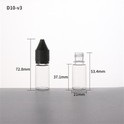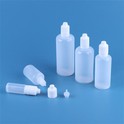By now, there's a good chance that – most of the time anyway – you don't microwave food or drink in plastic dishes. It's also quite plausible that if you're a parent, you didn't wait until bisphenol A – or BPA – was banned in baby bottles and sippy cups to avoid buying such products containing the chemical of concern, which is widely used in making polycarbonate plastics.
But a great swirl of scientific data has stirred up no shortage of provocative, if still preliminary, concerns about the impact some plastics may potentially have on the environment and human health. Research, including a 2014 study published in the journal Environmental Pollution, indicates water bottles might leach chemicals when stored at higher temperatures – something the industry disputes, asserting they're safe, even when left in, say, a hot car. Other studies have recently brought much attention to so-called microplastics – or tiny pieces of plastic (typically describing plastic particles under 5 millimeters) – polluting the environment and being consumed by people, without an understanding for if or how they may impact a person's health.
Tests conducted by the State University of New York in Fredonia as part of an Orb Media investigation found that the vast majority – or 93 percent – of bottled water samples evaluated showed some signs of contamination with microplastics. Study results were initially released in March, and the research has since been published, last month, in the peer-reviewed journal Frontiers in Chemistry. In a statement, the International Bottled Water Association said the study "is not based on sound science, and there is no scientific consensus on testing methodology or the potential health impacts of microplastic particles. Therefore, this study's findings do nothing more than unnecessarily scare consumers."
Experts say more study is needed to understand the implications of findings on microplastics for not only the environment but also for human health.
While continued research is needed to sort things out, particularly in the area of microplastics, health experts say there are still ways consumers may be able to lower their risk in light of other concerns that have been raised about chemicals used in some plastics.
The American Academy of Pediatrics points out that BPA, which is used to harden plastic containers and to line metal cans, "can act like estrogen in the body and potentially change the timing of puberty, decrease fertility, increase body fat, and affect the nervous and immune systems." Further, phthalates, another chemical of concern that "makes plastic and vinyl tubes used in industrial food production flexible, may affect male genital development, increase childhood obesity, and contribute to cardiovascular disease," the AAP warns. The use of certain types of phthalates has been banned by the Consumer Product Safety Commission in some child-care products like teething rings and other toys they might put in their mouth.
Because kids are still developing, clinicians are especially keyed into the possible risks they might face. Still, experts say adults should proceed with caution for their own sake, as well.






